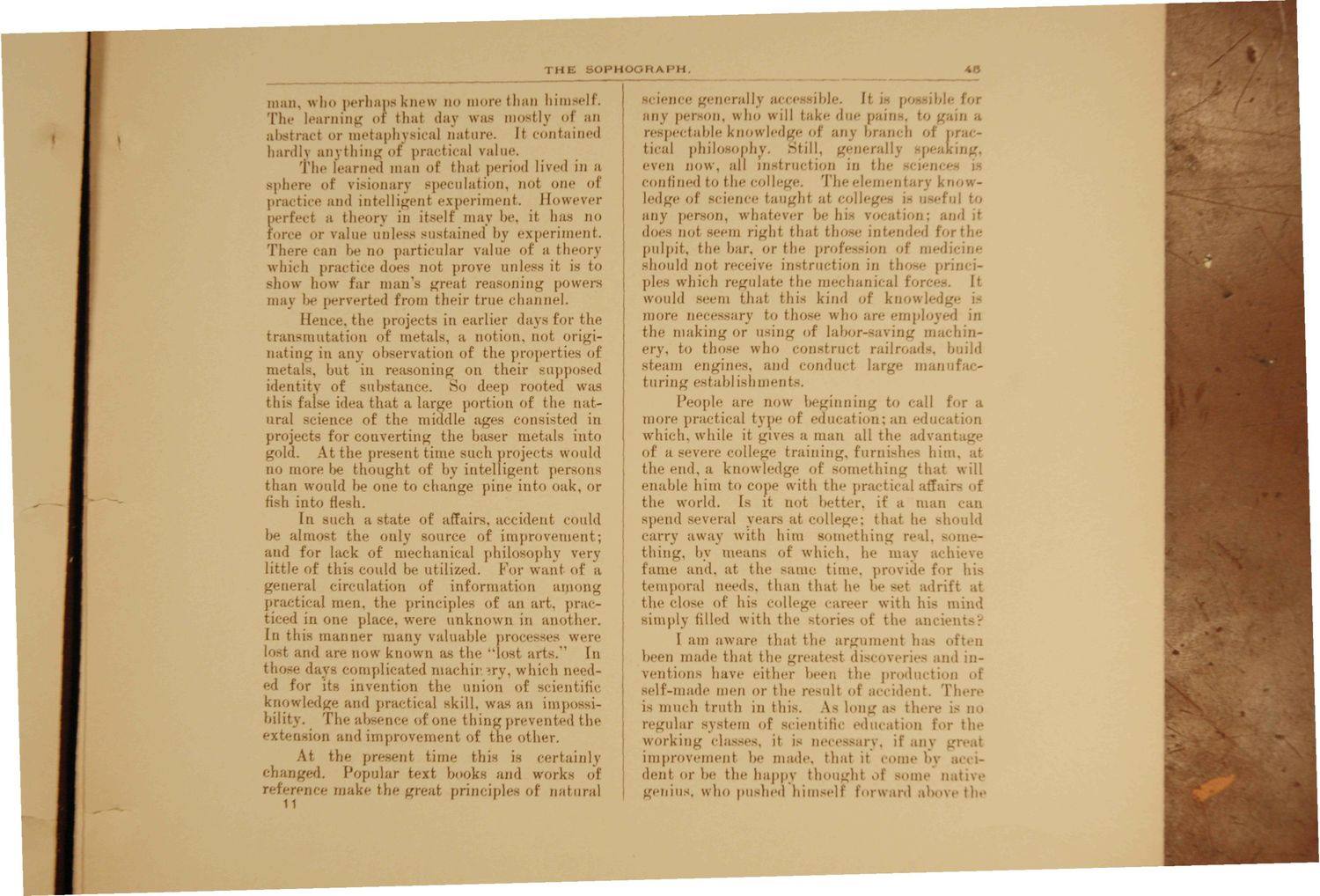| |
| |
Caption: Sophograph - 1891
This is a reduced-resolution page image for fast online browsing.

EXTRACTED TEXT FROM PAGE:
THl <>H O'.KAI'M. 4/i man. who perhaps knew no more than himself. The learning of thai day was mostly of an abstract or metaphysical nature. It contained hardly anything of practical value. The learned man of that period lived in a sphere of visionary speculation, not one of practice and intelligent experiment. However perfect a theory in itself may be, it has no tone or value unless sustained by experiment. There can be no particular value of a theory which practice does not prove unless it is t<» -how how far man's great reasoning powers may he perverted from their true channel. Hence, the project- in earlier days for the transmutation of metals, a notion, not originating in any observation of the properties of metals, but in reasoning on their supposed identity of substance. So deep rooted was this false idea that a large portion of the natural science of the middle ages consisted in projects for converting the baser metals into gold. At the present tiiu such projects would no more he thought of by intelligent persons than would be one to change pine into oak. or fish into Mesh. In such a state of affairs, accident could he almost the only source of improvement; and for lack of mechanical philosophy very little of this could he utilized, for want of a general circulation of information among practical men, the principles of an art. practiced in one place, were unknown in another. In this manner many valuable processes were lost and are now known a- the •'lost art-.'* In those days complicated machir jry, which need1 for its invention the union of scientific knowledge and practical skill, was an imp* ihilitv. The absence of one thing prevented the extension and improvement of the other. At the pi -iit time this is certainly changed. Popular text books and works of reference make the great principles of natural 11 cience generally acee ible. It in p Me for any person, who will take due paii t< i respectable knowledge of an. branch of \>i tical phil< 'phy. Still, generally -j King, even now. all instruction in the )<•/)<•<•con lined to the college. The elementary know ledge of science taught at colleges ful I any person, whatever he hi- vocation; and i' does not seem right that those intended fort} pulpit, the bar, or the profe ion of medicim hould not receive instruction in those principles which regulate the mechanical for I" would seem that this kind of knowled more necessary to those who are employed in tin,' making or using of labor-saving machinery, to those who construct railroads, build steam engines, and conduct large manufacturing establishments. People are now beginning to !1 for a more practical type of education: an education which, while it gives a man all the advantage of a severe college training, furnishes him. a the end. a knowledge of something that will enable him to cope with the pra ical affair- of the world, [s it not better, it a man can spend several years at college; that he Bhould carry away with him something real, something, by means of which, he may achiei fame and. at the Bamc time, provide for his temporal needs, than that he be v(>t adrift a the close of his college career with his mind imply tilled with the stories of the ancients I am aware that the argument has often been made that the greatest discoveries and inventions have either been the production -elf-made men or the result of accident. Then is much truth in this. A- long as there is no regular system of scientific education for th< r working clae s, it is necessary, if any Li t improvement be made, that it come b\ dent or be the happy thought of some nativi genius, who pushed himself forward aboveth
| |